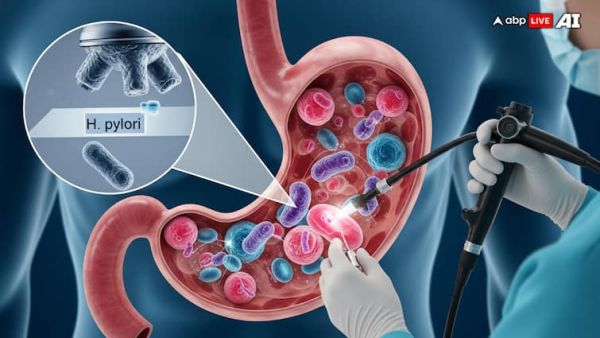
If you thought that the stomach bug is a harmless infection quickly eliminated with a regimen of antibiotics, here is a shocker that a global study has thrown up. A common bacterium is fuelling millions of stomach cancer cases globally. But there is hope. Timely screening may offer a vital solution, experts say.
The study, led mainly by medical experts and researchers from the International Agency for Research on Cancer (IARC/WHO), has been published in the Nature Medicine journal.
For the Nature Medicine study, scientists examined the incidence of stomach cancer from 185 countries in 2022 and combined it with projections of future deaths.
The study highlights a looming global health challenge and predicts millions of future gastric cancer cases. Thankfully, many of these likely cancer cases could be prevented through targeted interventions such as Helicobacter pylori screening and eradication programs, researchers say.
What is H. Pylori bacteria?
The Helicobacter pylori, or the H. pylori, is a bacterium that infects the lining of the stomach and is thought to be spread from person to person and via contaminated food and water. Research is still ongoing into how the infection is spread and how it may cause stomach cancer and another type, non-Hodgkin lymphoma (a type of blood cancer that originates in the lymphatic system, which is part of the body's immune system).
The researchers said that ‘screen-and-treat' strategies to catch H. Pylori cases across the globe may be able to detect stomach cancer cases early. This could cut the number of overall stomach cancer cases by up to 75%.
Dr Jin Young Park, leader of the gastric cancer prevention team at IARC and co-author of the study, said, "It is essential that health authorities make gastric cancer prevention a priority and accelerate efforts to control it by planning pilot and feasibility projects, including H. pylori screen-and-treat programmes."
ABP Live spoke to Dr Manish Dodmani, Consultant, Medical Gastroenterology, KIMS Hospitals, Thane, a leading expert in gastroenterology, to seek insights into understanding the implications of this ground-breaking research. Here's what Dr Dodmani told us.
ABP Live: Should more people in India get tested for H. pylori, even if they have no symptoms?
Dr. Manish Dodmani: H Pylori is the most common bacterium worldwide. It primarily affects the stomach, increasing the acid and causing changes in the pH. It causes ulcers in the stomach and small intestine. If a patient is asymptomatic and has no family history of any immediate blood relatives suffering from stomach cancer or ulcers, etc, we do not suggest that they test for H Pylori bacterial infection.
Also, if patient has prior history of like ulcer in the stomach and in past they have not been treated for H pylori infection, or if we suspect some malignancies like gastric maltoma (a form of blood cancer that affects the stomach), or if a patient of iron deficiency anaemia is not responding to the routine treatment, then we do investigate and call for Helicobacter pylori (H. pylori) tests.
Maltoma of the stomach, also known as gastric MALT lymphoma, is a type of blood cancer that originates in the stomach's mucosal lining.
ABP Live: How can Indians lower their risk of getting H. pylori?
Dr. Manish Dodmani: The H pylori is a bacterium that can be transmitted through the faecal-oral route as well as the gastro-oral route. In developing countries like India, most children get infected with H. Pylori by the time they are 10-12 years old. Nearly 65 to 70% Indians may have this bacteria in their stomach, but not every case turns symptomatic. Practising good hygiene, having clean and nutritious food, and clean water can lower the risk of getting H pylori infection.
ABP Live: If someone has H. pylori but no symptoms, should they still get treatment?
Dr. Manish Dodmani: Usually, we do not test those who are not symptomatic, except in the cases of few cases, as I explained earlier. For those exceptional cases, where we see a history of gastric cancer and refractory anaemia, then we check for the past history of H pylori infection or follow up of gastric cancer.
For many people, H. pylori does not cause issues and will not need the standard treatment of antibiotics, but it can be the cause of ongoing indigestion, bloating or nausea.
ABP Live: What signs should people watch for to catch stomach problems early?
Dr. Manish Dodmani: H. pylori infection may present itself with different symptoms. In some cases, mild indigestion can be a part of the initial symptoms. Apart from that, pain in the upper abdominal region, burning in the upper abdominal region, a bloating sensation after eating, fullness in the stomach even after a light meal; all these indicate that there is some stomach problem.
Apart from this, if the stomach develops cancer, there are other signs or symptoms like vomiting, showing of blood in the vomit, change of colour of vomit to dark brown or black. Some patients suffer sudden, unexplained weight loss, loss of appetite, low haemoglobin, especially in men can be the early sign of stomach cancer as well. None of these symptoms should be neglected, and one must seek a doctor's opinion immediately.
ABP Live: Are there new ways to treat stomach cancer better now?
Dr. Manish Dodmani: Sadly, most of the cancer cases are not diagnosed in the early stages, called the first or the second stage, simply because symptoms manifest pretty late. Sometimes symptoms are very vague. Symptoms like bloating or a burning sensation in the stomach get neglected, as most people usually consider these as signs of a harmless acidity problem.
But if stomach cancer is diagnosed in the early stage, we can treat the gastric cancer with better outcomes. There is a new advanced treatment known as endoscopic mucosal resection, as well as endoscopic submucosal resection. Depending on the stage of the cancer and depending on the depth of this cancer, the treatment can vary, and these are the newest technologies. Also, not all stomach cancer requires surgery if they are diagnosed in the early stage and just by doing the endoscopic treatment, many patients can skip other treatment modalities like any surgery or chemotherapy or radiation.
The findings from this global study serve as a wake-up call, especially for countries like India, where Helicobacter pylori infection is widespread and often overlooked. As Dr. Dodmani points out, public awareness is key, and one must not ignore persistent symptoms for long. The time to act is now, i.e. before today's neglected stomach bug becomes tomorrow's national cancer crisis.
Kirti Pandey is a senior independent journalist.
[Disclaimer: The information provided in the article, including treatment suggestions shared by doctors, is intended for general informational purposes only. It is not a substitute for professional medical advice, diagnosis, or treatment. Always seek the advice of your physician or other qualified healthcare provider with any questions you may have regarding a medical condition.]
-
Online scam in Dubai with Archana Puran Singh's family, these are important tips to avoid travel fraud.

-
Are you travelling with another car's FASTag in your car? Know the rules before you get into trouble.

-
If you are looking for a profitable professional course after passing the 12th, then know about your work

-
The sitting model changed in schools of this state with a more than 25 percent Muslim population; there will be no backbenchers.

-
BPSC Admit Card 2025 OUT: Admit card of Bihar Assistant Engineer Recruitment Exam released, download from the direct link here
